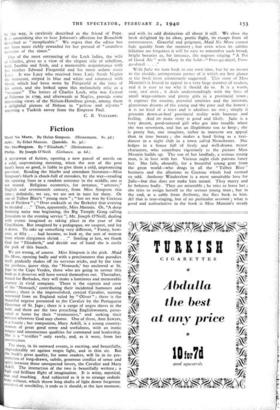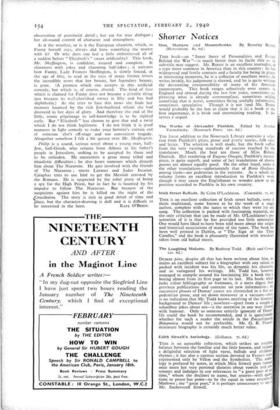Fiction
A REVIEWER of fiction, opening a new parcel of novels on a cold, unpromising morning, when the rest of the post hasn't been so good, is liable to give them a cold, unpromising pre-view. Reading the blurbs and attendant literature—Miss Simpson's blurb is chock-full of mistakes, by the way—reading the opening lines or a random sentence in the middle, one is not wooed. Religious eccentrics, for instance, " utterers," English and seventeenth century, from Miss Simpson this time ; definitely, we say, we are not in tune for them. Or one of Talbot Blair's "young men " ; "her art was by Cocteau out of Pavlova " ; "Over cocktails at the Berkeley that evening he decided. .." Thus, apparently, Miss Mannin. Or, "A deep booming noise was beginning, the Big Temple Gong calling Jerusalem to the evening service "; Mr. Joseph O'Neill, dealing with events imagined as taking place in the year of the Crucifixion. But imagined by a pedagogue, we suspect, and lay it down. To take up something very different, "Fanny, how- ever, at fifty. . . had become, to look at, the sort of woman from whom clergymen shrink . . ." Smiling at last, we thank God for "Elizabeth," and decide out of hand she is easily the pick of this bunch.
We are wrong, of course. Miss Simpson is the pick. Maid No More, opening badly and with a preciousness that parodies itself, gradually shakes off its nervous tricks, and by the time the perilous, queer ship, the 'Nonsuch,' has anchored at St. Jago in the Cape Verdes, those who are going to savour this book as it deserves will have sorted themselves out. Thereafter, bound for Barbados, they will make a luminous and memorable Journey in vivid company. There is the captain and crew of the 'Nonsuch,' contributing their incidental humours and actions ; there is the impoverished, cynical Cavalier, turning westward from an England ruled by " Oliver " ; there is the beautiful negress presented to the Cavalier by the Portuguese Governor of St. Jago ; there is a cargo of negro slaves in the hold, and there are the two preaching Englishwomen, perse- cuted at home for their "testimonies," and seeking their mission wherever God may choose. One of these, Ann Sawyer, is a fanatic ; her companion, Mary Askill, is a young country- woman of great good sense and usefulness, with an ironic tongue and unconscious qualities for command and leadership. She is a " testifier " only rarely, and, as it were, from her unconscious.
The story, in its outward events, is exciting, and beautifully, imponderably set against tropic light, and in thin air. But the book's great quality, for somc readers, will lie in its pre- sentation of long-drawn, subtle, generous conflict of sense and pirit between those unexpected lovers, the Cavalier and Mary Askill. The interaction of the two is beautifully written ; a gh and brilliant flight of imagination. It is witty, mystical, C and touching. And subjected as it is to strange ordeals rnm without, which throw long shafts of light down forgotten rridors of sensibility, it ends as it should, at the lust moment, and with its odd distinction all about it still. We close the book delighted by its clear, poetic flight, its escape from all commonness. Graceful and poignant, Maid No More cannot fade quickly from the memory ; but even when its subtler felicities are forgotten it will be easy to remember such broad, bright beauties as, for instance, the negroes singing "A Pot of Good Ale" with Mary in the hold—" Poto-gu-dayel, Poto- gu-dayel. . . ."
With Julie we turn back to our own time, but by no means to the shoddy, unimportant corner of it which my first glance at the book most erroneously suggested. This story of Miss Mannin's is bound to appeal to a very large number of readers, and it is easy to see why it should do so. It is a warm, sane, real story, it deals understandingly with the lives of small wage-earners and pretty girls in a provincial town ; it exposes the routine, personal anxieties and the insistent, glamorous dreams of the young and the poor and the honest ; it is no kind of a tract and it idealises no one ; simply it presents down-at-heel provincial reality with humour and feeling. And its main story is good and likely. Julie is a very decent, good-natured girl who got into trouble when she was seventeen, and has an illegitimate son to keep ; she is pretty but, one imagines, richer in innocent sex appeal than in true beauty ; she makes a hard living as a taxi- dancer in a night club in a town called Newchester. She lodges in a house full of lively and well-drawn minor characters, who contribute vigorously to the picture Miss Mannin builds up. The son of her landlady, a serious young man, is in love with her. Various night club patrons fancy her. She falls, absurdly, for a beautiful young gent from the great world—who drags in all the "Talbot Blair" business and the allusions to Cocteau which had seemed so odd. Anthony Winderslow is a most unsuitable love for Julie—but that does not make him unreal. They marry and he behaves badly. They are miserable ; he tries to leave her ; she tries to resign herself to the serious young man ; but in the end, at a cable from Anthony, she flies back to him. All that is true-ringing, but of no particular account ; what is good and authoritative in the book is Miss Mannin's steady
observation of provincial detail ; her ear for true dialogue ; her all-round control of character and atmosphere.
Is it the weather, or is it the European situation, which, as Fanny herself says, always did have something the matter with it? Or why does one feel a little embarrassed all of a sudden before " Elizabeth's " sweet artificiality? This book, Mr. Skeffington, is confident, assured and complete. It shimmers with jokes and charming half-jokes ; it narrates how Fanny, Lady Frances Skeffington, is slowly forced, at the age of fifty, to read in the eyes of many former lovers the incredible news that her beauty, her legendary beauty, is gone. (A premiss which one accepts in this artificial comedy, but which is, of course, absurd. The kind of face which is claimed for Fanny does not become a pitiable thing just because its well-cherished owner is fifty and has had diphtheria.) As she tries to face this news she finds her memory haunted by the rich Jew-husband whom she had divorced in her days of glory. And therefore the end of the little, ironic pilgrimage to self-knowledge is to be sighted early. But " Elizabeth " has chosen to give that end a twist which I do not think legitimate. I do not think it is good manners in light comedy to make your heroine's curtain out of someone else's off-stage and too convenient tragedy. Altogether somehow I felt a bit queasy over Mr. Skeffington.
Philip is a sound, serious novel about a young man, half- Jew, half-Greek, who returns from Athens to his father's people in Jerusalem, seeking to be accepted by them and to be orthodox. He encounters a great many tribal and ritualistic difficulties ; he also hears rumours which disturb him about The Nazarene. He gets involved with the friends of The Nazarene ; meets Lazarus and Judas Iscariot. Caiaphas tries to use hint to get the Messiah arrested by the Romans. He is suspected by the rebel party of being a spy for the High Priest, but in fact he is haunted by his impulse to follow The Nazarene. But because of the suspicions against him he is killed on the night of the Crucifurion. The story is rich in good detail of time and place, but the character-drawing is dull and it is difficult to
be interested in the hero. KATE O'BRIEN.







































 Previous page
Previous page